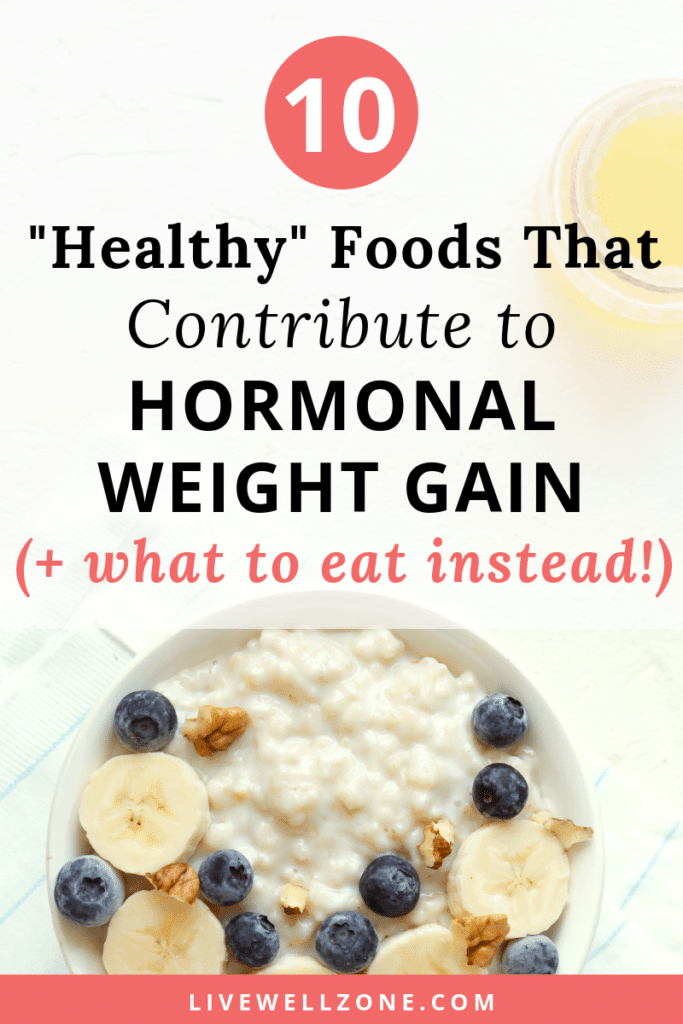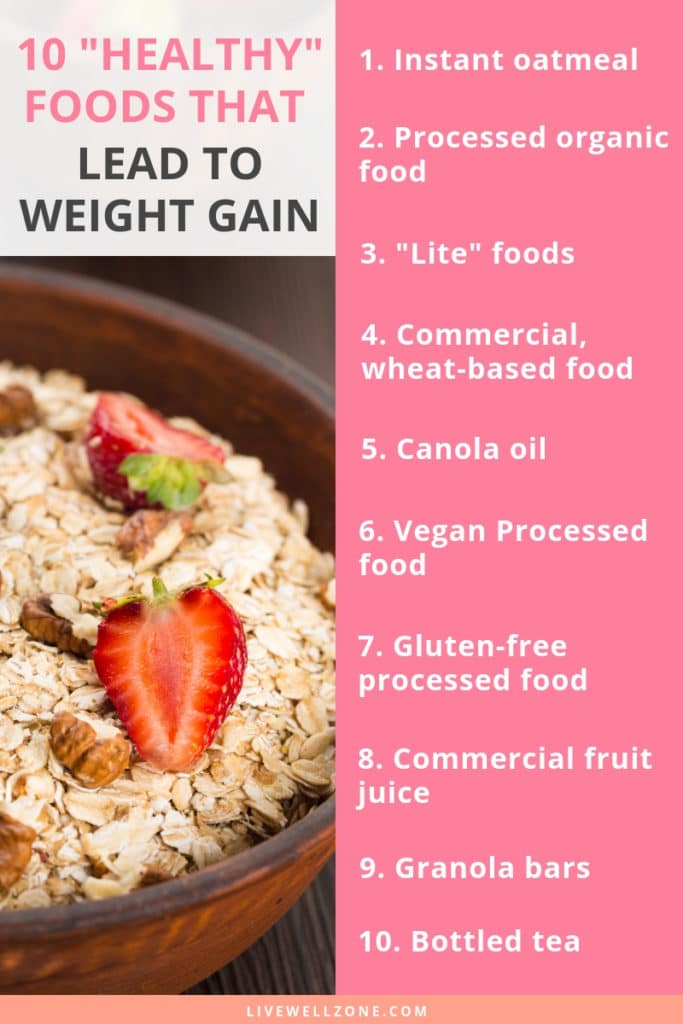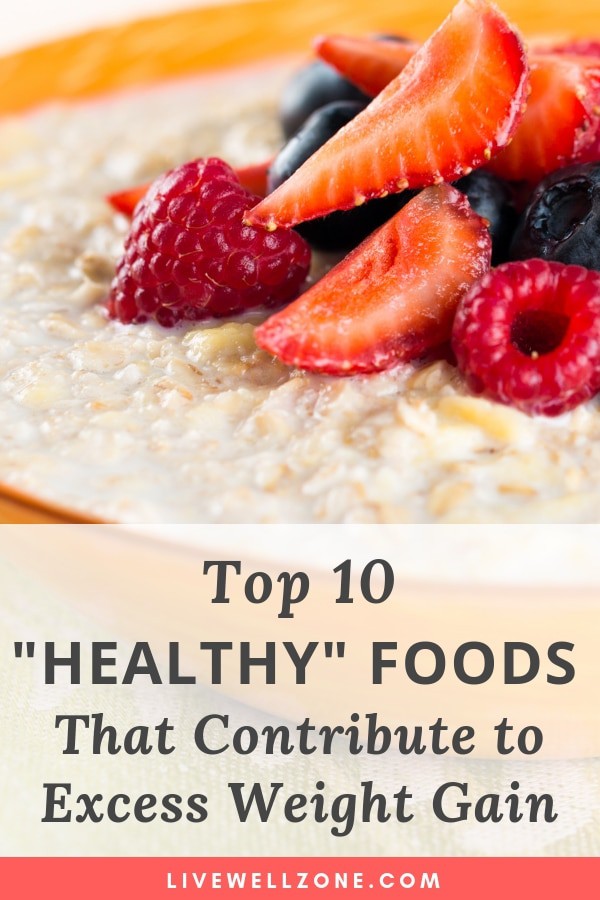Are you counting calories, cutting carbs or eating boring foods, but still struggling with excess weight gain?
If the answer is “yes!” then you’re probably dealing with hormone-related weight gain.
In this post, we will look at 10 popular “healthy” foods that disrupt hormones and contribute to excess weight gain.
In addition, this post gives you healthier alternatives that you can eat to boost weight loss and satisfy your taste buds!
WHAT CAUSES EXCESS WEIGHT GAIN?
There are multiple things that control excess weight gain.
The two that you definitely want to be aware of are:
- The endocrine system.
- The immune system.
Let’s take a brief look at both systems and why you should pamper them in order to support weight loss.
The Endocrine System
Your endocrine system is in charge of making all of your hormones.
Hormones are chemical messengers that regulate or affect everything that happens in the body.
This means your hormones are in charge of all signals that tell the body to either lose weight or gain weight.
And this also means that if anything happens to interfere with your hormonal communication, then you can start struggling with “overnight” weight gain. Or, you may hit a weight loss plateau.
So, how do you prevent or overcome this?
Well, you start by avoiding foods that disrupt hormone health (we’ll dive more into those foods shortly!).

The Immune System
What comes to mind when you hear the words “immune system?”
You probably think of the flu, the common cold, bacteria and so on, right?.
But do you associate your immune system with weight gain or weight loss?
Although it’s not always discussed, your immune system actually affects your weight. Here’s why:
- Ingredients like trans fats, processed sugar, food additives, preservatives and pesticides are all seen as “pathogens” by your immune system.
- Pathogens trigger the inflammatory response from the immune system.
So, this means that the more unhealthy food ingredients you eat, the harder your immune system has to work to fight off the negative effects of those ingredients.
And the more your immune system works, the more it uses up your body’s resources.
Unfortunately, this can slow down other processes in the body, and in particular, your metabolism.
Therefore, it’s important to minimize your exposure to the foods that we’re going to be looking at.
10 “HEALTHY” FOODS THAT CONTRIBUTE TO WEIGHT GAIN
1. “Fat-free”, “Lite” or “Low-Fat” foods
For many years there was a belief that fat makes you fat.
That belief was further solidified by saturated fats being demonized.
As a result, grocery stores were saturated (yeah, I couldn’t help it!) with fat-free, low-fat and lite foods.
But there’s one small problem: once the natural fat is removed from food, it tastes worse than paper!
So, to compensate for the bad taste, food manufacturers put refined sugars into fat-free foods.
They also use hormone-disrupting additives (like MSG) to improve the taste of many food items.
The problem here is that both refined sugar and additives like MSG mess with your hormones and immune system. And this is no good for the waistline.
And even though newer research is showing that fats are not evil, nor do they cause obesity, there are still plenty of fat-free/lite products on the market.
So, the takeaway is this: when a processed or packaged food has the label “low-fat,” “fat-free” or “lite” watch out!
Better alternatives:
- Reduce your consumption of packaged and processed food.
- When buying packaged foods, take time to read the label first. There are clean brands out there that don’t have junk ingredients!
- Rather than buying everything, consider making some of your own stuff at home. Whether it’s granola or ice cream, you can often make your own healthy versions at home quite easily.
By the you can learn more about MSG and why it’s so bad for weight loss in this post on MSG, hormones and weight loss).
2. Wheat-Based Food
To wheat or not to wheat?
As the gluten-free movement continues to grow, many people still feel confused, wondering if it’s just a fad or if there’s really some validity to it>
Here’s what my research on this topic has revealed.
First, wheat is not inherently evil or bad.
However, the problem seems to lie in modern wheat. Specifically, its gluten content as well as how it is farmed, processed and used to make products like bread.
Modern wheat – specifically, the variety often used in the U.S. – is often higher in gluten, compared to the varieties available in places like Europe (source).
Second, a compound called potassium bromate is sometimes added to flour in the U.S.
Some animal studies show that potassium bromate is a possible carcinogen, which has prompted other Canada, The EU and other countries to ban the use of potassium bromate (source).
Furthermore, potassium bromate contains bromine which may compete for iodine. This may be problematic for thyroid function, which relies on iodine (1, 2).
And if that’s not enough, we also have to be aware that the way we make most commercially sold bread is very different these days.
This is very different from many decades ago when bread dough had to go through an 18-24 hour fermentation process with yeast.
That yeast did one important thing: predigest the gluten so that your tummy doesn’t have to!
Today’s bread can be made in 3 or 4 hours. So you’re eating a ton of gluten that your digestive system is not designed to handle!
And if that’s not enough gluten is associated with leaky gut syndrome (which messes up your hormones), inflammation and other health issues (3, 4).
Better alternative:
- Buy gluten-free varieties of bread.
- When it comes to things like pasta, look for imported varieties. These days you can easily find pasta that is imported from countries like Italy (in theory, this would be made from a lower gluten wheat variety).
- Eat sprouted breads. The sprouting process reduces the gluten content and also makes it easier to absorb the minerals in the wheat (source).
- Try out sourdough bread. Similar to sprouted bread, sourdough bread has a lower gluten content (mainly because the dough is fermented for a long period of time – sometimes up to 72 hours!). In addition, sourdough bread has a lower sugar content that standard bread.
- If you’re the DIY type, experiment with making your own bread!
For more insight into how wheat is farmed and processed, watch the report below.
3. Packaged or processed organic food
There’s only one situation in which you can safely equate the term “organic” with healthy: when buying fresh fruits and veggies.
But when it comes to packaged foods like cookies, chips granola bars or pasta sauce, organic doesn’t automatically mean “healthy.”
Yes, the fact that they are organic means they don’t contain pesticides.
But many still have canola oil, MSG, dyes and tons of other toxins.
Better alternative:
- Read the ingredients list before you grab that organic cookie or snack!
4. Canola Oil
Although it is often marketed as healthy, canola oil is a trans fat and a genetically-modified oil.
Canola has a host of side effects that I discuss here, but one of the most important is the fact that it can cause liver damage.
This is significant because the liver detoxes toxins, including excess estrogen and other hormones, from the body.
Without a healthy liver, you get a build up of toxins that can lead to inflammation and excess weight gain. Check out this post for more on liver health.
Better alternative:
- Use whole, unrefined oils. Olive, coconut, hemp and avocado oil are all good, hormone-balancing options to start with.
5. Vegan Packaged or Processed Foods
Veganism continues to grow in popularity every day.
Generally speaking, veganism is seen as a healthy lifestyle.
But when it comes to vegan packaged food, it can be just an unhealthy as non-vegan varieties.
It all boils down to the fact that most items in a grocery store are meant to sit on the shelf for years.
The farther out the expiration date is, the more processed the food has to be.
The more processed a food is, the more additives and preservatives tend to be in the food.
These are all toxins that compromise your endocrine and immune systems, and promote excess weight gain.
Better alternative:
- Always read the ingredients list so that you know what you’re getting.
- Whenever you can, make your own meals. This is the best way to have better control over what goes into your body.
6. Gluten-free Packaged Foods
In the same way that fat-free or lite foods are perceived to be healthy, “gluten-free” snacks are often perceived as healthy too.
But the thing is a lot of gluten-free stuff is high in sugar and other not-so-good ingredients.
If you’ve ever used gluten-free flours, you know that they don’t have the same glue-like, binding effect that wheat flour does.
To compensate for the lack of gluten, many businesses put other unhealthy fillers in the gluten-free cookies or cakes.
Better alternative: Stick to foods that are naturally gluten-free. You reduce your chances of being exposed to all sorts of weirdness!
7. Granola Bars and Trail Mixes
With ingredients like oats, almonds, walnuts and raisins, granola bars and trail mixes appear to be healthy.
Except…they’re not!
Depending on the brand, granola bars and trail mixes contain lots of refined sugars, as well as dyes, additives and preservatives.
You can only imagine the amount of inflammation this causes and how you can end up with excess weight gain.
Best alternative:
- Check ingredients before buying to make sure there are no weird chemicals or refined ingredients.
- Make your own trail mix and granola at home using your favorite ingredients.
8. Store-bought Fruit Juice
Whole fruits are great for you.
Homemade, fresh-pressed juices are also a healthy choice.
As for store-bought fruit juices…well, they’re not all that great.
So what is it that makes store-bought fruit juice less than desirable? It’s the fact that they are pasteurized.
The pasteurization process kills the good stuff (enzymes, phytochemicals and many other nutrients) that are in the fruit.
A lot of that good stuff plays a role in helping you maintain a healthy weight.
When you kill that good stuff, you are left with a juice that is a concentrated shot of sugar, with little nutritional value.
Better alternative:
- Eat whole fruit.
- Make your own smoothies and fruit juices at home.
9. Pre-sweetened and Flavored Instant Oatmeal
Oatmeal is perfect for a busy, modern lifestyle.
It’s full of healthy fiber.
It’s naturally gluten-free.
And it’s a convenient way to start your day.
Unless you happen to be using sweetened and flavored instant oatmeal!
You see, instant oatmeal doesn’t have the fiber content of traditional oatmeal.
And since it is usually sweetened, that means it contains lots of refined sugar.
In addition, most instant oatmeal using some kind of flavoring.
Yes, the label might say “natural flavors”, but that doesn’t mean there’s anything natural about it.
Better alternative:
- Stick to old-fashioned oats.
- Use sweeteners like raw honey and maple syrup.
10. Bottled Tea
Whether it’s green tea or hibiscus tea, there are plenty of ready-to-drink teas on the market.
However, these teas have to be pasteurized so that they last on store shelves (source). Overall, pasteurization destroys many nutrients.
In addition, when it comes to something like green tea, the bottled versions have very low antioxidant activity (anywhere from 10 – 100x lower than regular brewed green tea).
Furthermore, these drinks are often sweetened with refined sugar, which has no real nutritional value (and doesn’t help when it comes to metabolic health).
Better alternative:
- Check the label before buying.
- Brew your own tea at home.
So there you have it! The top 10 foods that contribute to excess weight gain.
As you can see, the key to simplifying weight loss is to focus on the quality of your food, not the quantity.
Now I’d love to hear your thoughts…Which foods do you find most helpful for weight loss? Share your tips in the comments.
Related Content:
Weight Gain Caused by Hormones: How to Reverse It




Hi
I am 39 years old and I would like to know if I am at risk of hormonal weight gain?
It depends on your lifestyle and diet. I suggest reading this article on hormonal weight gain to see whether it’s applicable to you.